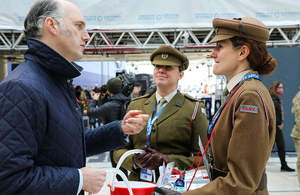Prime Minister pledges to build on Brexit achievements in 2022
- 1 January 2022 marks one-year anniversary of UK-EU Trade and Cooperation Agreement.
- Government has used Brexit freedoms to establish a point-based immigration system, secure the vaccine rollout and strike new trade deals around the world.
- PM pledges to move “further and faster” to build on these achievements in 2022.
The Government will go “further and faster” to maximise the opportunities of Brexit, the Prime Minister, Boris Johnson has said in comments marking the one-year anniversary of the UK-EU Trade and Cooperation Agreement (TCA).
The landmark agreement, which came into effect a year ago today, is the world’s biggest zero-tariff, zero-quota free trade deal. It allows businesses in Britain to trade freely with Europe while also being able to seize new trading opportunities with countries around the world.
Since the agreement was signed, the Government has sought to capitalise on new freedoms by cutting red tape for businesses, reforming EU rules and regulations and boosting trade abroad to create new jobs here in the UK. Key successes include:
- Taking back control of our borders – replacing freedom of movement with a points-based immigration system that attracts the brightest and best talent from around the world.
- Securing the vaccine rollout – streamlining procurement processes and avoiding cumbersome EU bureaucracy to deliver the fastest vaccine rollout anywhere in Europe last year.
- Striking new free trade deals – with over 70 countries, worth over £760 billion, including landmark deals with Australia and New Zealand that pave the way for our entry to the £9 trillion Comprehensive and Progressive Agreement for Trans-Pacific Partnership.
- Axing red tape and bureaucracy – ending the Tampon Tax, simplifying complex EU alcohol duty rates, and forging ahead to remove the ban on selling in pounds and ounces and to restore the crown stamp onto the side of pint glasses.
- Strengthening our standards – allowing the UK to go further than the EU and set improved environmental standards, animal welfare and product safety.
Having left the EU, the UK is now able to establish a regulatory regime which is free of prescriptive EU rules and best suits our own interests.
As part of this effort, officials are currently reviewing thousands of individual EU regulations automatically kept on the statute book after Brexit – known as Retained EU Law – to ensure they benefit people and businesses in the UK. Laws which do not meet this test will be reformed or repealed.
Alongside the Review into Retained EU Law, work is already taking place across Whitehall to create a better regulatory framework and ensure that the UK is at the leading edge of science and technology. This involves:
- Driving forward work on Artificial Intelligence, where the UK is already at the forefront of global progress, to grow investment and support research and development.
- Enhancing Britain’s potential as a world leader in the Future of Transport, including autonomous maritime vessels, self-driving cars and drones and modernising outdated vehicle standards.
- Creating a pro-growth, trusted data rights regime, more proportionate and less burdensome than the EU’s GDPR.
- Rolling out a new agricultural system and changing the rules on gene-edited organisms, to enable more sustainable and efficient farming and help produce healthier and more nutritious food.
- Reforming medical devices regulations to foster the development of new and emerging devices, harnessing cutting edge technology and software. This will ensure access to the world’s most innovative technologies for NHS patients while maintaining quality and safety.
These plans build on recommendations from the Taskforce for Regulatory Reform, Innovation and Growth (TIGRR) led by Sir Iain Duncan Smith, which reported to government earlier this year.
Prime Minister Boris Johnson, said:
A year ago today we entered our new relationship with the EU through the world’s biggest ever zero-tariff, zero-quota free trade deal – the UK-EU Trade and Cooperation Agreement.
That was just the start – our mission since has been to maximise the benefits of Brexit so that we can thrive as a modern, dynamic and independent country.
We’ve replaced free movement with a points-based immigration system. We’ve secured the fastest vaccine rollout anywhere in Europe last year by avoiding sluggish EU processes. And from Singapore to Switzerland, we’ve negotiated ambitious free trade deals to boost jobs and investment here at home.
But that’s not all. From simplifying the EU’s mind-bogglingly complex beer and wine duties to proudly restoring the crown stamp onto the side of pint glasses, we’re cutting back on EU red tape and bureaucracy and restoring common sense to our rulebook.
The job isn’t finished and we must keep up the momentum. In the year ahead my government will go further and faster to deliver on the promise of Brexit and take advantage of the enormous potential that our new freedoms bring.

